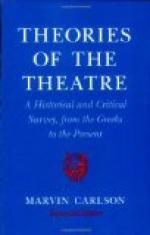Slowly but surely we are growing very tired of dramatists who look upon life with a wry face instead of with a brave and bracing countenance. In due time, when (with the help of Mr. Barrie and other healthy-hearted playmates) we have become again like little children, we shall realise that plays like As You Like It are better than all the Magdas and the Hedda Gablers of the contemporary stage. We shall realise that the way to heal old sores is to let them alone, rather than to rip them open, in the interest (as we vainly fancy) of medical science. We shall remember that the way to help the public is to set before it images of faith and hope and love, rather than images of doubt, despair, and infidelity.
The queer thing about the morbid-minded specialists in fabricated woe is that they believe themselves to be telling the whole truth of human life instead of telling only the worser half of it. They expunge from their records of humanity the very emotions that make life worth the living, and then announce momentously, “Behold reality at last; for this is Life.” It is as if, in the midnoon of a god-given day of golden spring, they should hug a black umbrella down about their heads and cry aloud, “Behold, there is no sun!” Shakespeare did that only once,—in Measure for Measure. In the deepest of his tragedies, he voiced a grandeur even in obliquity, and hymned the greatness and the glory of the life of man.
Suppose that what looks white in a landscape painting be actually bluish gray. Perhaps it would be best to tell us so; but failing that, it would certainly be better to tell us that it is white than to tell us that it is black. If our dramatists must idealise at all in representing life, let them idealise upon the positive rather than upon the negative side. It is nobler to tell us that life is better than it actually is than to tell us that it is worse. It is nobler to remind us of the joy of living than to remind us of the weariness. “For to miss the joy is to miss all,” as Stevenson remarked; and if the drama is to be of benefit to the public, it should, by its very presence, convey conviction of the truth thus nobly phrased by Matthew Arnold:
Yet
the will is free:
Strong is the Soul, and wise,
and beautiful:
The seeds of godlike power
are in us still:
Gods are we, Bards, Saints,
Heroes, if we will.—
Dumb judges, answer,
truth or mockery?
XII
PLEASANT AND UNPLEASANT PLAYS
The clever title, Plays Pleasant and Unpleasant, which Mr. Bernard Shaw selected for the earliest issue of his dramatic writings, suggests a theme of criticism that Mr. Shaw, in his lengthy prefaces, might profitably have considered if he had not preferred to devote his entire space to a discussion of his own abilities. In explanation of his title, the author stated only that he labeled his first three plays Unpleasant for the reason that “their dramatic power is used to force the spectator to face unpleasant facts.” This sentence, of course, is not a definition, since it merely repeats the word to be explained; and therefore, if we wish to find out whether or not an unpleasant play is of any real service in the theatre, we shall have to do some thinking of our own.




